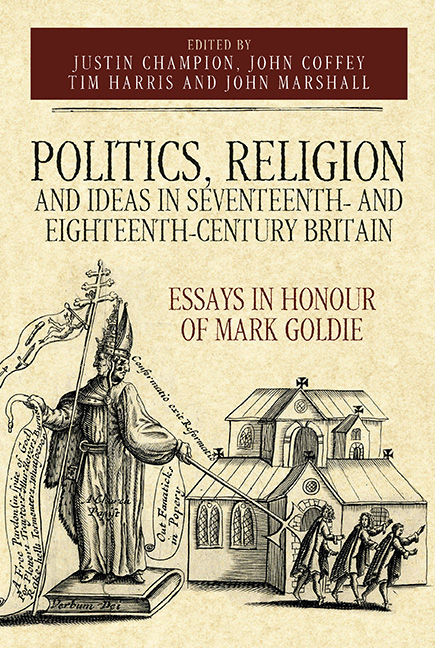 Politics, Religion and Ideas in Seventeenth- and Eighteenth-Century Britain
Politics, Religion and Ideas in Seventeenth- and Eighteenth-Century Britain Book contents
- Frontmatter
- Dedication
- Contents
- Notes on Contributors
- Acknowledgements
- Notes on Text
- Abbreviations
- Introduction: Mark Goldie – An Appreciation
- 1 Constitutional Royalism Reconsidered: Myth or Reality?
- 2 Teaching Political Thought in the Restoration Divinity Faculty: Avant-Garde Episcopacy, the Two Kingdoms and Christian Liberty
- 3 Violence, Protest and Resistance: Marvell and the Experience of Dissent after 1670
- 4 Bulstrode Whitelocke and the Limits of Puritan Politics in Restoration England
- 5 The Assassination of Archbishop Sharp: Religious Violence and Martyrdom in Restoration Scotland
- 6 Compassing Allegiance: Sir George Mackenzie and Restoration Scottish Royalism
- 7 Corruption and Regeneration in the Political Imagination of John Locke
- 8 Locke the Censor, Locke the Anti-Censor
- 9 London, Locke and 1690s Provisions for the Poor in Context: Beggars, Spinners and Slaves
- 10 The Reception of Locke's Politics: Locke in the République des Lettres
- 11 Court Culture and Godly Monarchy: Henry Purcell and Sir Charles Sedley's 1692 Birthday Ode for Mary II
- 12 Thanksgivings and the Signs of the Times: The Apocalypse in the Long Eighteenth Century
- 13 The ‘Secret Reformation‘ and the Origins of the Scottish Catholic Enlightenment
- 14 The Surprising Lineage of Useful Knowledge
- 15 The Vicissitudes of Innovation: Confessional Politics, the State and Philosophy in Early Modern England
- A Bibliography of the Writings of Mark Goldie
- Index
- Studies in Early Modern Cultural, Political and Social History
- Tabula Gratulatoria
11 - Court Culture and Godly Monarchy: Henry Purcell and Sir Charles Sedley's 1692 Birthday Ode for Mary II
Published online by Cambridge University Press: 12 October 2019
- Frontmatter
- Dedication
- Contents
- Notes on Contributors
- Acknowledgements
- Notes on Text
- Abbreviations
- Introduction: Mark Goldie – An Appreciation
- 1 Constitutional Royalism Reconsidered: Myth or Reality?
- 2 Teaching Political Thought in the Restoration Divinity Faculty: Avant-Garde Episcopacy, the Two Kingdoms and Christian Liberty
- 3 Violence, Protest and Resistance: Marvell and the Experience of Dissent after 1670
- 4 Bulstrode Whitelocke and the Limits of Puritan Politics in Restoration England
- 5 The Assassination of Archbishop Sharp: Religious Violence and Martyrdom in Restoration Scotland
- 6 Compassing Allegiance: Sir George Mackenzie and Restoration Scottish Royalism
- 7 Corruption and Regeneration in the Political Imagination of John Locke
- 8 Locke the Censor, Locke the Anti-Censor
- 9 London, Locke and 1690s Provisions for the Poor in Context: Beggars, Spinners and Slaves
- 10 The Reception of Locke's Politics: Locke in the République des Lettres
- 11 Court Culture and Godly Monarchy: Henry Purcell and Sir Charles Sedley's 1692 Birthday Ode for Mary II
- 12 Thanksgivings and the Signs of the Times: The Apocalypse in the Long Eighteenth Century
- 13 The ‘Secret Reformation‘ and the Origins of the Scottish Catholic Enlightenment
- 14 The Surprising Lineage of Useful Knowledge
- 15 The Vicissitudes of Innovation: Confessional Politics, the State and Philosophy in Early Modern England
- A Bibliography of the Writings of Mark Goldie
- Index
- Studies in Early Modern Cultural, Political and Social History
- Tabula Gratulatoria
Summary
A rare anecdote about Queen Mary II and the composer Henry Purcell relates to the origins of the ode for her thirtieth birthday on 30 April 1692, Love's Goddess Sure was Blind.
The queen having a mind one afternoon to be entertained with music, sent to Mr. Gostling, then one of the chapel … to Henry Purcell and Mrs. Arabella Hunt, who had a very fine voice, and an admirable hand on the lute … Mr. Gostling and Mrs. Hunt sung several compositions of Purcell, who accompanied them on the harpsichord; at length the queen beginning to grow tired, asked Mrs. Hunt if she could not sing the old Scots ballad ‘Cold and Raw’, Mrs. Hunt answered, yes, and sung it to her lute. Purcell was all the while sitting at the harpsichord unemployed, and not a little nettled at the queen's preference of a vulgar ballad to his music; but seeing her majesty delighted with this tune, he determined that she should hear it upon another occasion; and accordingly in the next birth-day song, viz, that for the year 1692, he composed an air to the words, ‘May her bright example chace Vice in troops out of the land’, the bass whereof is the tune to ‘Cold and raw’.
Love's Goddess Sure was Blind is among the finest of the six birthday odes created for Mary II. However, the 1692 birthday ode for Mary II commands interest beyond the aesthetic. It is also a vivid micro-history of the political preoccupations of the court ode, of the ways in which monarch and courtier used the court ode to advance shared and individual agendas, and of the interaction between late Stuart court culture and the public sphere.
This essay considers the 1692 birthday ode to Mary II from three perspectives. The first section places the ode's text by Sir Charles Sedley alongside those of other court odes. It analyses the ways in which the court ode associated moral reform and godly monarchy with Mary II and her husband and co-monarch, William III. This development was especially important to creating a language that legitimised and celebrated the reign and rule of a female monarch who was also a wife.
- Type
- Chapter
- Information
- Politics, Religion and Ideas in Seventeenth- and Eighteenth-Century BritainEssays in Honour of Mark Goldie, pp. 219 - 238Publisher: Boydell & BrewerPrint publication year: 2019


